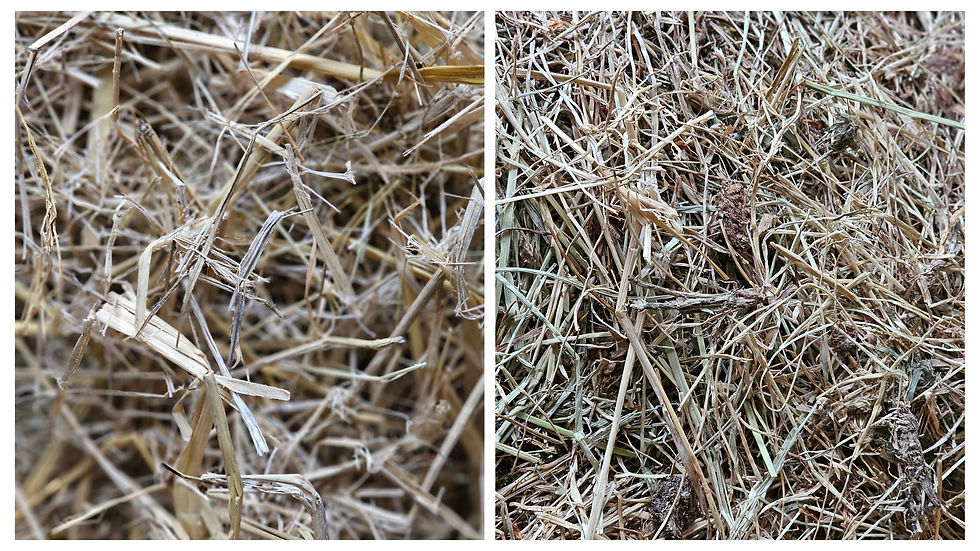Feeding horses straw: for when your good doer is doing too good.
- Bonnie Sweeney
- Feb 24, 2024
- 3 min read
Updated: Oct 12, 2024

This summer has been very mild and very wet, which has caused a lot of chaos with the natural cycles. Horses don’t know if their coat is coming or going, trees are partially losing their leaves only to try to hang on to them when the heat makes another appearance, and the grass is growing like crazy. The media lead the public to believe it would be a hot dry summer, and whilst this would have brought the threat of fire, it also would bring relief to horse owners who struggle with metabolic and laminitic horses.
The dry weather didn't come, and the heat has been sparse, which means the grass is green and full of sugar and for another year owners of good doers are having to carefully manage the weight of their horses to prevent them getting sick. Every day I see requests for recommendations of low sugar hay on social forums by owners fighting the battle of the bulge with their equines. Yet even with these options it’s not always enough due to the sheer volume of roughage a horse needs to consume to maintain healthy digestive function and prevent ulcers.
So, is there an even lower calorie alternative to low sugar hays? The answer is yes, straw.
Straw is not a particularly popular feed in Australia, but it has been fed successfully to horses in Europe for years and it may just be the answer to horse owner’s prayers. However, there is some reluctance to make the change as a previous study found an increase in gastric ulcers of horses fed only straw.
More recent studies have found that feeding straw to partially replace hay only has benefits for an overweight horse.

In 2010 a study found that the amount of energy required by the horse to metabolize wheat straw vs long stem hay was negligible. However, as straw provides less energy to begin with this means more of the calories provided by straw is required just to break it down, compared to long stem hay.
In 2020 a study in the UK took 40 native ponies and split them between two groups. Group A was fed 50:50 straw:hay for roughage, Group B was fed just hay. At the end of the study it was found all horses in Group A lost weight, while only 3 in Group B lost weight and the group had an overall increase in weight.
In 2021 a study comparing 50:50 hay:straw (Group S) and 100% hay diets (Group CON) found that Group S had longer feeding times and had a lower overall energy intake. Group S also had lower plasma insulin levels than Group CON, indicating it would be a better option for horses suffering from insulin dysregulation (eg, metabolic syndrome, cushings (PPID) etc) which leads to weight gain. There was also no sign of increased gastric ulcers in either group.
These studies highlight several benefits from adding straw to a horse’s diet. Including: prolonged feeding time, lowering of overall dietary energy intake, lowering of insulin levels and weight loss. They also found that replacing 50% of the hay with straw had no negative impact on the digestive tract. Concluding that up to half of the horse's daily hay can be replaced with straw safely.
Whilst straw isn’t always the most palatable of feeds, I have found that mixing it with hay in a slow feeder can encourage a horse to try it while they are adjusting to the new roughage. As always with feed, it’s important to make sure the straw you are using is of good quality and free of mould or other contaminants.
References:
Vernet J, Vermorel M, Martin-Rosset W. Energy cost of eating long hay, straw and pelleted food in sport horses. Animal Science. 1995;61(3):581-588. doi:10.1017/S135772980001417X
Dosi M, Kirton R, Hallsworth S, Keen J, Morgan R. Inducing weight loss in native ponies: is straw a viable alternative to hay? VetRecord. 2020;187(8):e60-e60. doi:10.1136/vr.105793
Jansson A, Harris P, Davey SL, Luthersson N, Ragnarsson S, Ringmark S. Straw as an Alternative to Grass Forage in Horses—Effects on Post-Prandial Metabolic Profile, Energy Intake, Behaviour and Gastric Ulceration. Animals. 2021; 11(8):2197. https://doi.org/10.3390/ani11082197







Comments